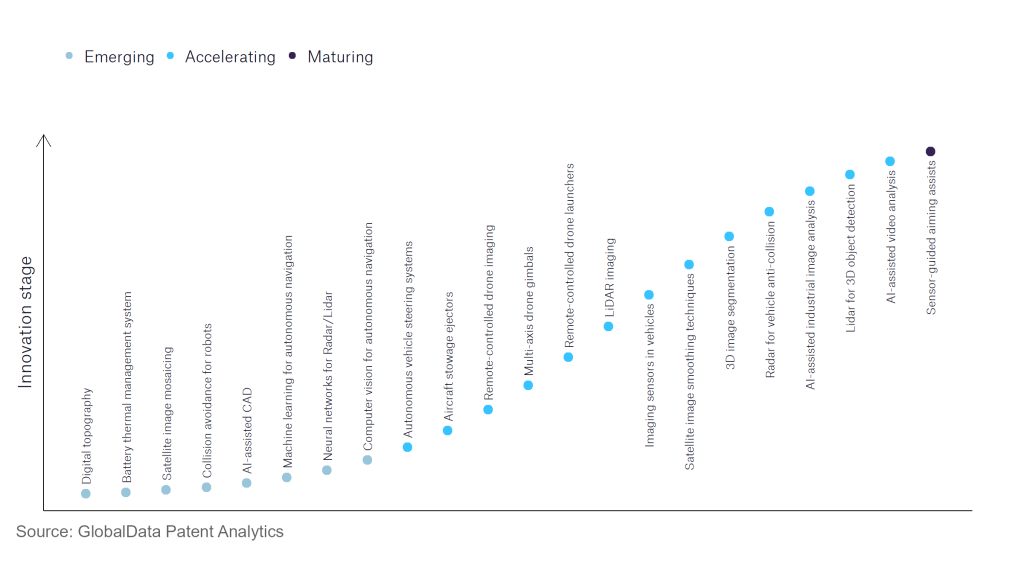The aerospace and defence industry continues to be a hotbed of innovation, with activity driven by developments in artificial technology and machine learning, and growing importance of technologies such as drones, satellite technology and big data. In the last three years alone, there have been over 174,000 patents filed and granted in the aerospace and defence industry, according to GlobalData’s report on Artificial Intelligence in Aerospace, Defence & Security: Satellite image smoothing techniques. Buy the report here.
However, not all innovations are equal and nor do they follow a constant upward trend. Instead, their evolution takes the form of an S-shaped curve that reflects their typical lifecycle from early emergence to accelerating adoption, before finally stabilising and reaching maturity.
Identifying where a particular innovation is on this journey, especially those that are in the emerging and accelerating stages, is essential for understanding their current level of adoption and the likely future trajectory and impact they will have.
180+ innovations will shape the aerospace and defence industry
According to GlobalData’s Technology Foresights, which plots the S-curve for the aerospace and defence industry using innovation intensity models built on over 262,000 patents, there are 180+ innovation areas that will shape the future of the industry.
Within the emerging innovation stage, machine learning for autonomous navigation, battery thermal management system, and satellite image mosaicing are disruptive technologies that are in the early stages of application and should be tracked closely. 3D image segmentation, AV on-board control systems, and lidar for 3D object detection are some of the accelerating innovation areas, where adoption has been steadily increasing. Among maturing innovation areas is sensor-guided aiming assists, which is now well established in the industry.
Innovation S-curve for artificial intelligence in the aerospace and defence industry

Satellite image smoothing techniques is a key innovation area in artificial intelligence
Satellite imagine smoothing is used to produce a less pixelated image. Image smoothing is traditionally applied to reduce image noise and when applied to satellite images it can make large amounts of data more useable.
GlobalData’s analysis also uncovers the companies at the forefront of each innovation area and assesses the potential reach and impact of their patenting activity across different applications and geographies. According to GlobalData, there are 60+ companies, spanning technology vendors, established aerospace and defence companies, and up-and-coming start-ups engaged in the development and application of satellite image smoothing techniques.
Key players in satellite image smoothing techniques – a disruptive innovation in the aerospace and defence industry
‘Application diversity’ measures the number of different applications identified for each relevant patent and broadly splits companies into either ‘niche’ or ‘diversified’ innovators.
‘Geographic reach’ refers to the number of different countries each relevant patent is registered in and reflects the breadth of geographic application intended, ranging from ‘global’ to ‘local’.
Patent volumes related to satellite image smoothing techniques
Source: GlobalData Patent Analytics
SZ DJI Technology is best known for producing drones which capture high-quality imaging, and its status as patent leader in this sector suggests it is leveraging its knowledge of imaging to provide a variety of image smoothing techniques. The patents refer specifically to image smoothing apparatuses, indicating that the company intends to provide solutions to satellite companies which could also be used for images captured by drones. The second largest company in this sector is NEC, which has also developed a number of image processing solutions including smoothing, including for the removal of cloud cover which would be significant for large-scale satellite imagery. Some other key patent filers in the industry include Raytheon Technologies, Baidu and Boeing.
In terms of application diversity, Great Circle Technologies is top, followed by Stradvision and SoftBank Group. Cognex is the leader by geographic diversity, followed by Stradvision and Daifuku.
The companies producing satellite image smoothing techniques will not necessarily be the same companies investing in satellite technology, but these advances will provide solutions and allow greater use of satellite imagery.
To further understand how artificial intelligence is disrupting the aerospace and defence industry, access GlobalData’s latest thematic research report on Thematic Research: AI in Defense.
Data Insights
From

The gold standard of business intelligence.
Blending expert knowledge with cutting-edge technology, GlobalData’s unrivalled proprietary data will enable you to decode what’s happening in your market. You can make better informed decisions and gain a future-proof advantage over your competitors.



